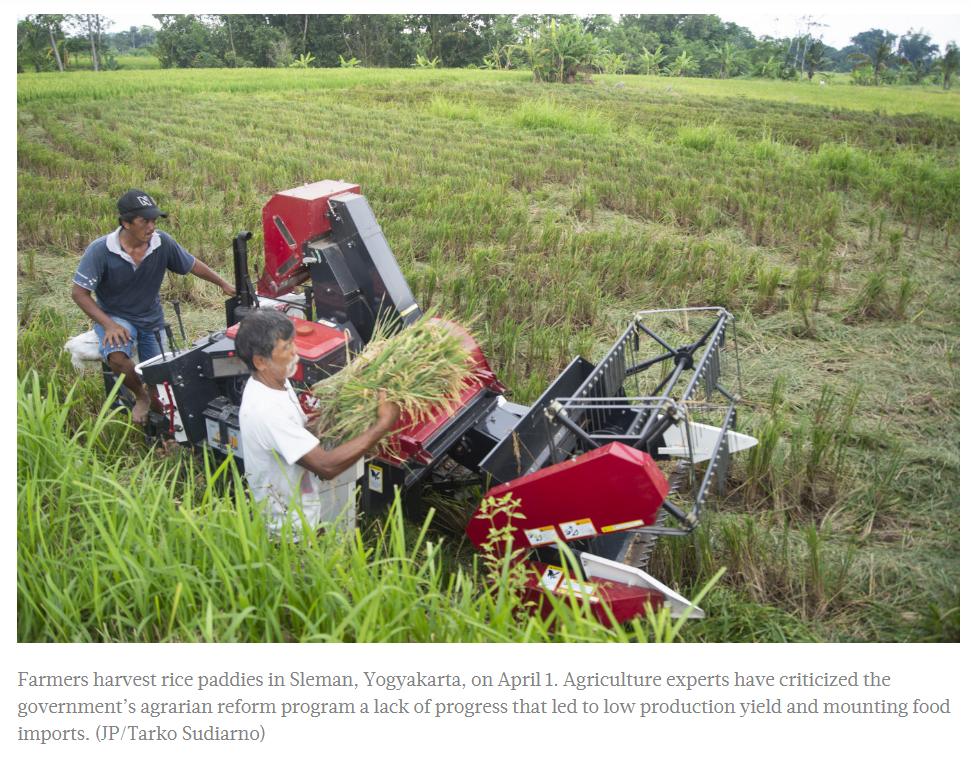Indonesia: Experts slam agriculture reform program, warn of shortage amid pandemic
University of Indonesia (UI) senior economist Faisal Basri has voiced his concerns over the increasing number of food imports over the years, saying that the government had been overly reliant on imports to cover the shortcomings of Indonesia’s agriculture industry.
“Last year we imported US$830 million worth of meat, $1.5 billion worth of fruits and $770 million worth of vegetables. Most of our imports also came from China, on which we become overly reliant,” he said during a virtual public discussion on Friday.
The government data presented by President Joko “Jokowi” Widodo on April 28 showed that over 20 provinces faced shortages of staple food, such as garlic, sugar, chili and eggs.
Agrarian Reform Consortium (KPA) secretary-general Dewi Kartika said the government’s botched agrarian reform program was to blame for the shortages as a vast plots of farmland were constantly being encroached by mining concessions and corporate plantations.
“According to the National Land Agency’s data, our farmland shrank by 650,000 hectares in 2018. Many were converted to be used by other business sectors such as palm oil, natural resources extraction and infrastructure,” she said.
Agrarian reform is among the National Priority Programs pushed by Jokowi’s first-term administration in an effort to better distribute development and improve the people’s life quality.
It includes programs that are expected to alleviate poverty in villages, improve the country’s food security and land production, acknowledge ownership rights over plots of land owned by individuals, the state and the general public, including land utilization for the people’s interest.
Dewi also slammed the government’s plan to clear 600,000 ha of peatland in Central Kalimantan to produce buffer stocks amid the shortage, as a similar measure under former president Soeharto on 1 million ha of peatland resulted in crop failure and subsequent starvation.
We tried that approach during the Soeharto era, which ended with catastrophic failures. In addition, the program also created unprecedented ecological damages,” she said.
According to a report released in April by the Global Network Against Food Crises, a humanitarian organization initiated by the World Food Program (WFP), a total of 135 million people lived with acute hunger at the end of 2019. The number was likely to jump to 265 million as countries enforcing quarantines amid the pandemic, the report said.
As Indonesia relies on imports, market protectionism, especially during COVID-19 outbreak, could prompt other countries to halt their food exports. Such a policy could cause food shortages in countries that relied on the exports to fulfill their needs, said agriculture expert Sofyan Sjaf.
“The [WFP] has warned that millions of people could face food shortages as agriculture production yields drop due to the pandemic,” he said during the same discussion. “We saw Vietnam take a precautionary step to prevent a potential shortage by clamping down on exports.”
Sofyan also urged the government to curb the COVID-19 outbreak in rural areas to prevent a decrease in food production, as the majority of farmers are vulnerable to the disease.
More than 22,000 people have contracted COVID-19, with the death toll reaching at least 1,300 as of Sunday afternoon.
“Around 61 percent of our farmers are over 45 years old. We should increase our testing in rural regions and should not relax large-scale social restrictions [PSBB] when the infection rate is still high,” he said.
Source: https://www.thejakartapost.com/news/2020/05/25/experts-slam-agriculture-reform-program-warn-of-shortage-amid-pandemic.html


 Thailand
Thailand




